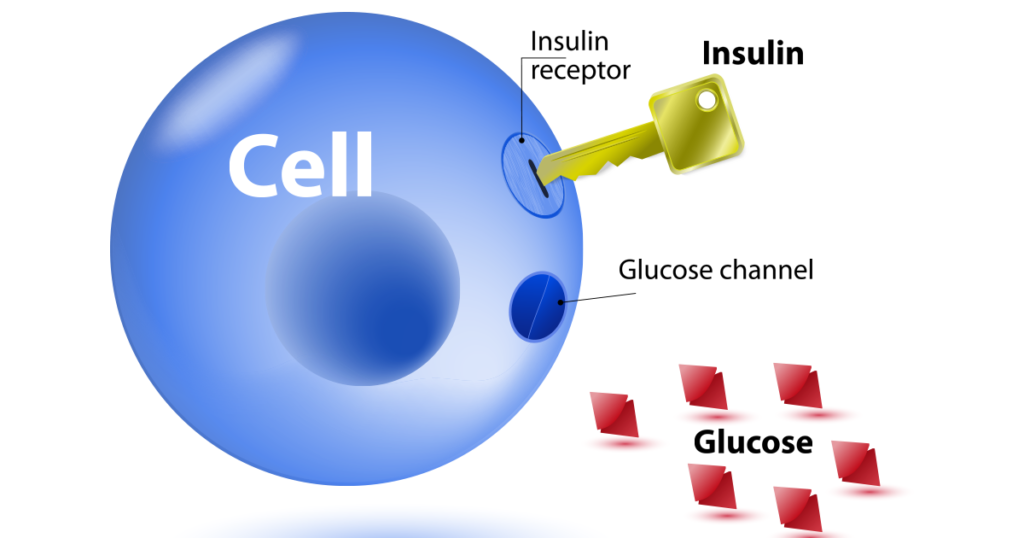What is Type 2 Diabetes?
A Type 2 Diabetes often comes with thoughts of lifetime pills, multiple health issues, eating boring food and more. Some of it is true, but only if you let it get to that. With the right food and lifestyle habits, Type 2 Diabetes can be reversed or put into remission.
Understanding Type 2 Diabetes Mellitus
Diabetes is a condition where the communication between glucose and insulin is compromised.
In a non-diabetic person, insulin behaves like a gatekeeper that allows and facilitates the entry of glucose molecules into the cells.
In type 2 diabetes, there is something known as “insulin resistance“. This leads to inadequate glucose entry into the cells. If there is little or no glucose entering the cells, your cell is starved, leading to tiredness, increase in appetite and muscle loss.
Simultaneously, since glucose has not entered the cells, it remains in the blood. High blood glucose levels put pressure on the kidneys to flush out the extra glucose leading to kidney damage in the long run. The extra blood glucose also impacts nerve and brain function.
The biggest impact of diabetes though is the immune system’s response to high blood glucose. The immune system starts worrying as a response to this change. This worry is called “inflammation”. This inflammation affects each and every function of the body right from digestion, immunity, blood pressure, etc. In fact, this is also one of the reasons why diabetics who contracted COVID-19 showed more complications.

(Read this article to understand Inflammation and it’s management better: “One Solution to All Your Health Woes“)
Symptoms of Type 2 Diabetes
- Increased thirst
- Weak, tired feeling
- Blurred vision
- Numbness or tingling in the hands or feet
- Slow-healing sores or cuts
- Unexplained weight loss
- Frequent urination
- Frequent unexplained infections
- Dry mouth
Diagnosis
The best way of knowing what’s happening is testing glycated hemoglobin (HbA1C) . This blood test indicates your average blood sugar level for the past two to three months. Results are interpreted as follows:
- Below 5.7% is normal.
- 5.7% to 6.4% is diagnosed as prediabetes.
- 6.5% or higher on two separate tests indicates diabetes.
Other tests you must do alongwith HbA1c include:
-
- Fasting blood sugar test:
- less than 100 mg/dL is normal
- 100 to 125 mg/dL indicates prediabetes
- 126 mg/dL or higher on two separate tests is indicative of diabetes
- Post Prandial blood glucose test:
- 100 to 140 mg/dL is normal
- 140 to 199 mg/dL indicates prediabetes
- 200 mg/dL or higher on two separate tests is indicative of diabetes
- Fasting blood sugar test:
Once you have done these tests, speak to your doctor to get a clear understanding of where you stand. If you are diagnosed with prediabetes or type 2 diabetes, then you will need to give your food and lifestyle a little more attention, atleast for a few months.
Monitoring Your Levels
Once you have started your medication or diet changes or exercise or whatever else you are working on, it is absolutely essential that you track your levels regularly. For the first few months, you might need to do so every 6-8 weeks. Once your levels are stabilized then a biannual or annual testing might suffice.
Here are the key tests you must consider:
-
- HbA1c
- Fasting Blood Glucose
- ESR
- hs-CRP
Very often, type 2 diabetes comes with other related issues like high cholesterol levels, high liver enzymes, uric acid levels, PCOS, etc. You will need to monitor those too, of course.
Now that you know the basics, it’s action time! Meet a doctor, get your prescriptions if needed. And meet your nutritionist (you can speak to me if you’d like “book a call with me”) to get your diet and lifestyle in order.
Irrespective what anyone says, just remember that there is always room for improvement. You may be able to stay off the medications altogether or you may need to take them for a few months and then stop eventually. Whatever the path is, you can reverse your type 2 diabetes or atleast manage it much much better.
The next article will take you through the lifestyle and diet changes that you must follow asap. Click here “”








Keri
Hi! I’ve been following your site for some time now and finally got the
bravery to go ahead and give you a shout out from
Dallas Texas! Just wanted to tell you keep up the great
job!